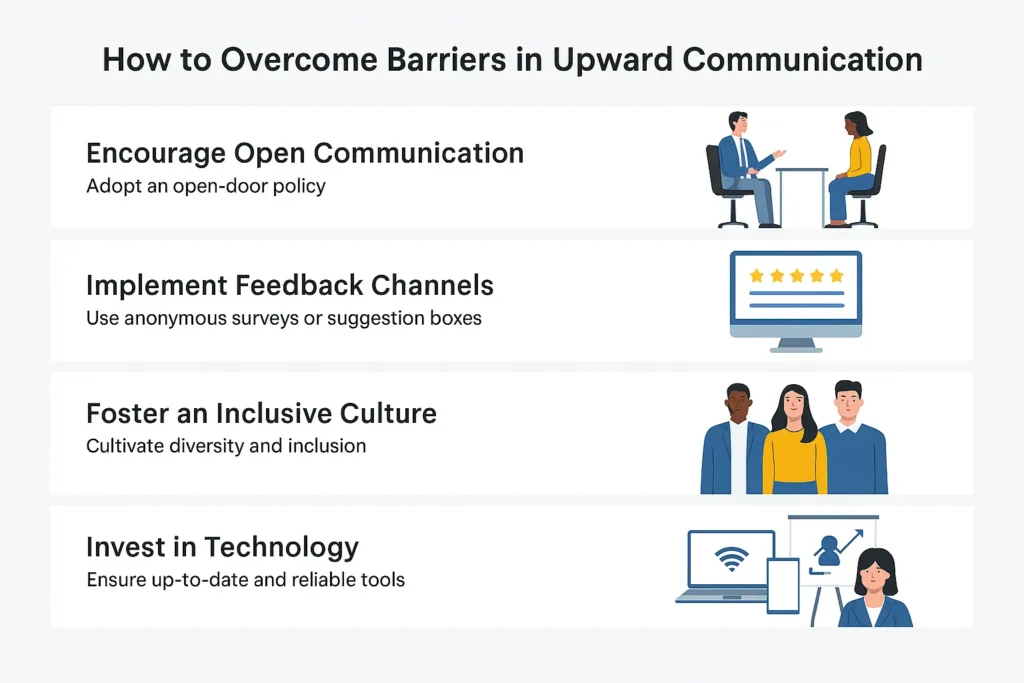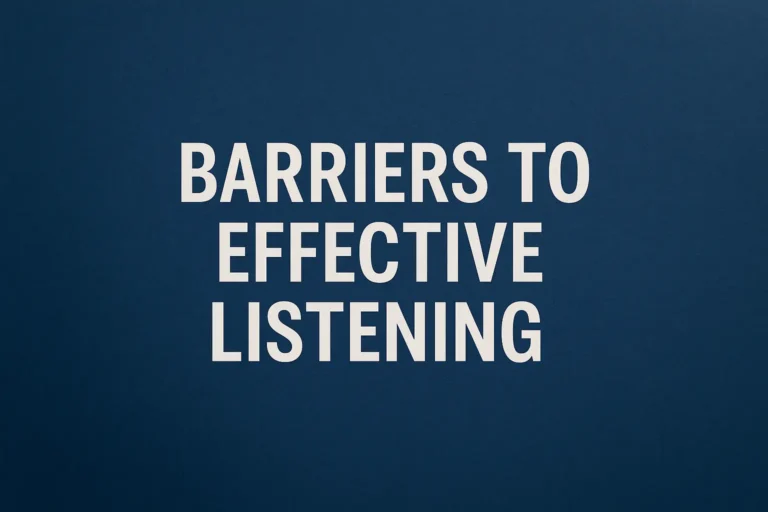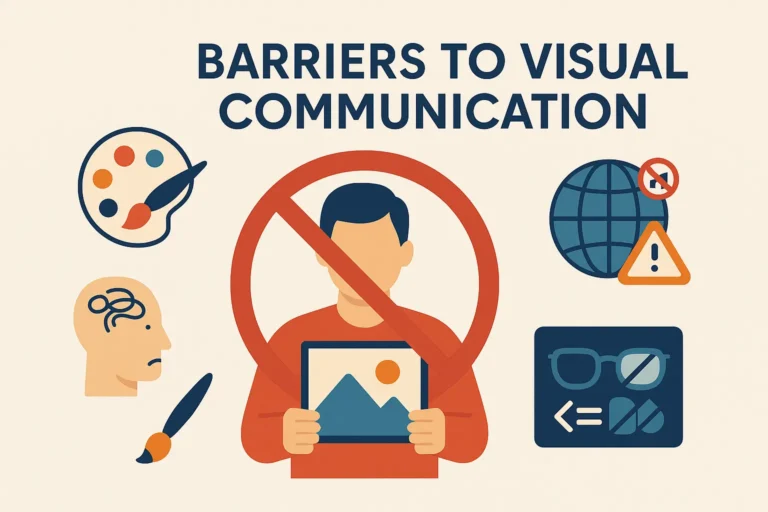Barriers to Upward Communication
Do you ever wonder why employees in many organizations hesitate to share their ideas, concerns, or honest feedback with senior leaders? Even the most open-minded managers sometimes don’t hear the real story from their teams. The main culprit is a set of barriers to upward communication that block honest, timely messages from reaching decision-makers. These barriers can cost organizations fresh ideas, early warnings, and the chance to fix problems before they grow.
What Is Upward Communication?
Upward communication is the flow of information from employees at the lower levels of an organization to those at the top. This might include sharing feedback, reporting problems, offering suggestions, or raising ethical concerns. Without strong upward communication, organizations risk making poor decisions and missing out on valuable insights.
Companies that support open feedback often experience higher morale, better problem-solving, and more successful change management.
Common Types of Barriers to Upward Communication
No workplace is immune to barriers to upward communication. Understanding the different types helps leaders and employees tackle them effectively.
Structural Barriers
Many organizations are built on layers of management. Complex hierarchies, rigid reporting lines, and unclear communication channels often make it hard for employees to reach top decision-makers. As a message moves up, it can be delayed, watered down, or even blocked by middle managers—a phenomenon known as gatekeeping. This filtering often distorts important information or discourages employees from sharing concerns at all.

Tall organizational structures, multiple approval steps, and strict protocols can also slow down upward communication. When employees are unsure of the right process or fear their words won’t reach the right ears, they may simply keep quiet.
Psychological Barriers
Psychological barriers are some of the hardest to spot, but they have a huge impact. Fear of retaliation, embarrassment, or job insecurity stops many people from speaking up. If employees worry that sharing negative feedback will damage their reputation or relationships with management, they’re unlikely to voice honest concerns.
A lack of psychological safety—the sense that it’s safe to speak up without negative consequences—can silence even the most loyal workers. Power imbalances and low self-esteem can also hold people back, making them feel that their opinions don’t matter.
Cultural Barriers
Cultural norms and values shape how people communicate. In some workplaces, strict respect for hierarchy discourages questioning or challenging superiors. Employees from diverse backgrounds may face extra challenges if their communication style differs from the dominant culture.
An organizational culture that discourages open dialogue, questions, or new ideas acts as a powerful barrier to upward communication. Similarly, lack of inclusivity can cause employees from minority groups to feel unwelcome or afraid to express themselves.
Technological Barriers
Modern communication relies on digital tools, but technology can create its own obstacles. Complicated software, unclear platforms, and lack of access to the right channels can make it hard to provide feedback or report concerns.
Some employees might not feel comfortable using online surveys or anonymous reporting tools, especially if they worry about their privacy. On the other hand, poor tech adoption means valuable insights get lost or ignored.
Gatekeeping and Information Distortion
Gatekeeping occurs when managers or supervisors intentionally or unintentionally block messages before they reach top leaders. Information may be filtered, reworded, or downplayed—sometimes to protect the team, sometimes to protect themselves. This distortion can create a false sense of confidence for leadership, while real issues remain unresolved.
Lack of Feedback Loops
When employees don’t see their feedback acted upon, or when there’s no response from management, motivation to communicate quickly fades. An absent or weak feedback loop leaves workers wondering whether their voices make any difference.
The Role of Psychological Safety in Upward Communication
Psychological safety is the belief that you can speak up at work without fear of embarrassment or punishment. According to research published in MIT Sloan Management Review, teams with high psychological safety experience better performance and greater learning.
If employees don’t feel safe raising concerns, they may avoid giving honest feedback. Managers play a crucial role by modeling active listening, admitting mistakes, and responding constructively to both good and bad news.
Anonymous Communication Tools and Whistleblowing Channels
Sometimes, the only way employees feel comfortable sharing sensitive information is through anonymous tools. Digital suggestion boxes, hotlines, and anonymous surveys give workers a safe space to express concerns, offer new ideas, or report wrongdoing.
Organizations with strong whistleblowing channels protect employees from retaliation and demonstrate a real commitment to transparency and ethical behavior.
Diversity, Inclusion, and Upward Communication
Diversity and inclusion efforts are not just about hiring—they also affect how upward communication works. Employees from underrepresented groups may face unique barriers, such as fear of being misunderstood, bias, or simply lacking role models in leadership.
Open, inclusive cultures encourage every team member to contribute their ideas and concerns. Training managers to be aware of their own biases and creating affinity groups can help build trust and reduce barriers to upward communication for everyone.
The Impact of Poor Upward Communication
When barriers to upward communication remain, organizations suffer in many ways:
- Missed Early Warnings: Employees on the front lines often spot problems first. Without honest feedback, small issues can grow into major crises.
- Low Engagement and High Turnover: If staff feel ignored, their motivation and loyalty drop. Turnover rises, driving up hiring and training costs.
- Uninformed Decisions: Leaders without access to real feedback make choices based on incomplete or filtered information, risking failed projects and wasted resources.
- Damaged Reputation: Ignoring or mishandling employee concerns can lead to public scandals, legal issues, or social media backlash.
A recent Gallup study found that businesses with open communication have higher engagement, better retention, and improved financial results.
Strategies to Overcome Barriers to Upward Communication
While every workplace is different, these proven strategies can help break down barriers to upward communication and create a more open, responsive culture.

Build Trust and Psychological Safety
Leaders must show that honest feedback is valued, not punished. Thank employees for speaking up—even about tough issues. Avoid blaming or shaming anyone who shares concerns. Admitting mistakes as a leader builds credibility and trust.
Simplify Communication Channels
Make it clear how employees can provide feedback or raise concerns. Use plain language, simple forms, and well-advertised channels. Offer both digital and face-to-face options to reach everyone, and train managers to accept input without judgment.
Close the Feedback Loop
After receiving feedback, let employees know what action was taken. Share outcomes in meetings, emails, or company forums. When feedback leads to real change, highlight those stories so others see that their voices matter.
Encourage Inclusive Practices
Promote a culture where every idea is respected, regardless of the speaker’s role, background, or experience. Offer training on unconscious bias and inclusive communication. Celebrate different viewpoints to make everyone feel welcome.
Use Anonymous Tools and Whistleblowing Systems
Implement digital platforms that allow for confidential reporting. Regularly remind staff about these options and assure them their privacy is protected. Respond quickly to anonymous concerns so employees see real results.
Limit Gatekeeping
Monitor how messages move through the organization. Teach middle managers the importance of passing feedback upward without editing or blocking. Regularly review communication flows for bottlenecks.
Leverage Technology Smartly
Use company intranets, collaboration tools, and apps to allow employees to ask questions or share ideas directly with leadership. Make sure these systems are easy to use and regularly updated.
Measure and Track Progress
Use surveys, focus groups, and exit interviews to monitor upward communication effectiveness. Share progress and areas for improvement with the whole company.
Benefits of Overcoming Barriers to Upward Communication
Addressing these barriers isn’t just good for morale—it leads to real, measurable business results:
- Faster Problem Solving: Issues are flagged and fixed quickly.
- Increased Engagement: Employees who feel heard are more committed and motivated.
- Better Decisions: Leaders get accurate information from those closest to the work.
- Higher Retention: A culture of trust keeps talented employees on board.
- Enhanced Reputation: Companies known for open communication attract better talent and loyal customers.
How to Improve Upward Communication
- Are anonymous reporting options in place and well publicized?
- Do leaders regularly ask for feedback from all levels?
- Are communication channels clear and simple?
- Is feedback acted on and results shared?
- Are managers trained in inclusive communication and bias awareness?
- Does your organization monitor upward communication and celebrate improvements?
If you can answer “yes” to most of these, your workplace is making strong progress. If not, these are excellent places to start.
Conclusion
Barriers to upward communication exist in every workplace, but they don’t have to hold your team back. When you address these obstacles with honesty, respect, and practical tools, you give everyone the chance to contribute—and help your organization thrive.
Start with small changes, such as providing safe feedback options, recognizing honest voices, and training managers to listen. The more you encourage upward communication, the stronger your business will become.





